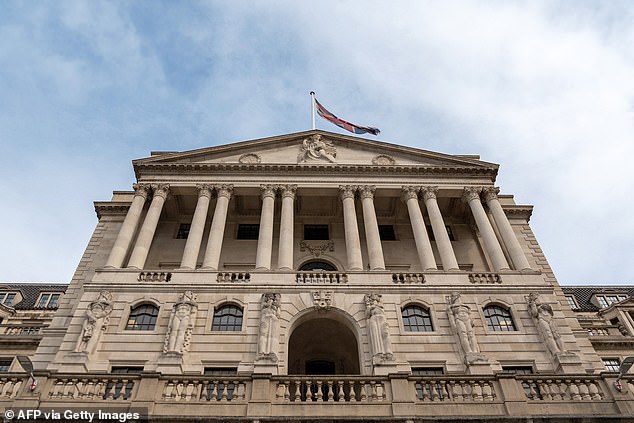The Bank of England has cut interest rates but warned that Rachel Reeves’s tax raid on businesses has pushed up food prices for British households.
For the first time in the Bank’s history, policymakers had to vote twice on how fast to slash borrowing costs amid a three-way deadlock.
In a boost to mortgage holders, Threadneedle Street economists cut rates by 0.25 percentage points to 4 per cent after an unprecedented second vote.
But inflation is forecast to hit 4 per cent later this year – higher than the Bank’s previous expectations and its 2 per cent target – casting doubt on pace of future reductions.
BoE governor Andrew Bailey today cautioned that subsequent rate cuts must be done ‘gradually and carefully’.
The warning came as the Bank’s Monetary Policy Committee (MPC) said rising prices are being driven in part by the Chancellor’s National Insurance Contributions (NICs) hike and inflation-busting minimum wage increase.

Unusual: There was a three-way split – and a second vote was triggered
Reeves’s policies have fuelled spiralling grocery bills, with food inflation expected to peak at 5.5 per cent this year after hitting 4.5 per cent in June.
Stubborn inflation increased uncertainty over the pace of future interest rate cuts after the Bank’s nine-person MPC was trapped in a three-way split on today’s decision.
Four members including Bailey voted to cut borrowing costs by 0.25 percentage points to 4 per cent, while four wanted to hold rates at 4.25 per cent.
Just one member, Alan Taylor, voted to cut rates faster, by 0.5 percentage points to 3.75 per cent.
For the historic second poll, Taylor backed a 0.25 percentage point cut to break the deadlock.
That meant the final decision was a 5-4 split in favour of setting rates at 4 per cent.
Bailey said: ‘We’ve cut interest rates today but it was a finely balanced decision.
‘Interest rates are still on a downward path but any future rate cuts will need to be made gradually and carefully.’
The Bank’s Monetary Policy report, which was published alongside the rates decision, said that ‘domestic labour costs are currently an important driver of food price inflation’.
‘That is in part because a relatively high proportion of staff in these sectors are paid at or close to the National Living wage, which increased by 6.7 per cent in April,’ it said.
‘Furthermore, overall labour costs of supermarkets are likely to have been disproportionally affected by the lower threshold at which employers start paying NICs in part because a relatively high proportion of supermarket staff is employed part time.’

Alan Taylor: The Wakefield born professor voted for a sharper cut
Higher employment costs have added 1 to 2 per cent to food prices so far, and a new packaging tax later this year is expected to pile further pressure on supermarkets.
Some products including coffee, chocolate and beef have also increased in price due to weather conditions.
Shoppers have already tried to reduce their supermarket spending by buying own-brand products, cheaper cuts of meat and larger value packs, the report said.
And grocers reported strong sales of ‘premium ready meals’ as Britons held back on eating out at restaurants in a bid to save money.
As well as hiking prices, businesses were trying to save money by cutting staffing levels including making redundancies and imposing hiring freezes, the report found.
And they warned that Angela Raynor’s workers’ rights bill was adding to their uncertainty.
‘To reduce the need for higher prices, many firms along the supply chain were trying to mitigate cost increases, including through reductions in headcount,’ the report said.
Bosses were looking towards automation, artificial intelligence and offshoring jobs as a solution to higher UK employment costs.
This article was originally published by a www.dailymail.co.uk . Read the Original article here. .

